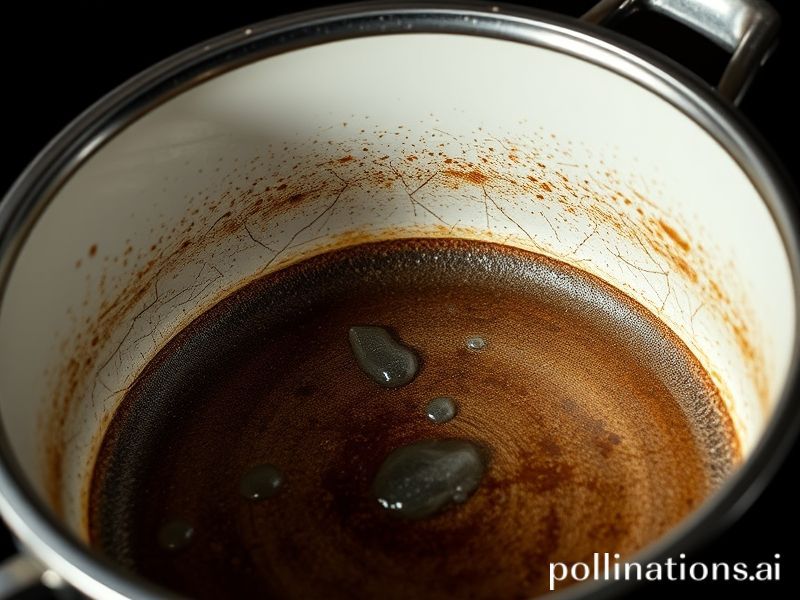Global Kitchen Catastrophe: When Your Cookware Moonlights as a Neurotoxin
Lead leaching cookware is the rare product recall that manages to unite Beijing bargain-hunters, Parisian gastronomes, and Midwestern coupon-clippers in one slow-motion panic. From the wet markets of Guangzhou to the Instagram kitchens of Copenhagen, the same grim punch-line is being served: dinner might be glazing itself with a light seasoning of cumulative brain damage, and the chef never even noticed.
The story began, predictably, in the global supply chain’s version of Dante’s ninth circle—an unnamed subcontractor’s subcontractor somewhere between Zhejiang and “we lost the paperwork.” Independent tests commissioned by consumer groups in the EU, Canada, and Kenya all found the same thing: ceramic-coated pots, brightly marketed as “toxin-free” or “granite-inspired,” were bleeding lead at levels that would make a Roman aqueduct blush. The threshold for alarm is 90 parts per million; some cheerful teal saucepans clocked in at 2,000 ppm, which is less cookware and more portable toxicology lab.
Cue the synchronized bureaucratic pirouette. The U.S. FDA issued a politely worded advisory that read like a passive-aggressive break-up text (“we suggest consumers may wish to consider alternative products”). The EU, never one to miss a regulatory festival, opened no fewer than three separate investigations, ensuring the paperwork will reach critical mass long after the pans have melted into landfill. Meanwhile, Kenya simply confiscated 12 tons of suspect stock and threatened vendors with “decisive action,” which in Nairobi bureaucratese could mean anything from a stern memo to an unexplained tax audit.
Industry spokespeople—always anonymous, always “disappointed”—insisted the lead was safely locked inside the glaze, a claim roughly as reassuring as “the radiation is mostly contained by the concrete sarcophagus.” The Chinese manufacturer blamed a “temporary lapse in raw-material verification,” a phrase that translates to “we bought the cheap stuff and hoped nobody would lick their cookware.” Social-media influencers pivoted overnight from “unboxing this cute cookware set!” to “here’s how to test for heavy metals at home,” demonstrating the same moral agility they bring to cryptocurrency.
But the real plot twist is the global shrug that followed. In the United Kingdom, where Brexit was supposed to restore imperial standards, Trading Standards officers admitted they no longer have the budget to test kitchenware unless it “poses an immediate fire risk.” Translation: if it doesn’t burst into flames on the hob, bon appétit. Across the Atlantic, American consumers filed a class-action lawsuit demanding compensation for “loss of enjoyment of life,” apparently forgetting that loss of enjoyment is the default setting for 2020s existence.
South of the equator, the scandal has acquired a darker shade of irony. Peru and Mexico still carry the genetic memory of colonial silver mines whose mercury and lead tailings continue to flavor local water tables. Adding a ceramic sauté pan to the mix is like worrying about second-hand smoke while standing in a burning building. In India, where millions still cook in aluminum vessels older than the republic, the recall notices are being used as wrapping paper for street-side chaat. Efficiency, if nothing else.
And yet, the broader significance is almost elegant in its malevolence. Lead, the eternal prankster of the periodic table, has circled back to remind us that globalization’s greatest triumph—making the same questionable product available from Ulaanbaatar to Uruguay—is also its Achilles heel. One sketchy batch of pigment and the entire planet gets a small but measurable IQ haircut. It’s equal opportunity poisoning, the wokest kind of industrial malpractice.
As of this writing, the offending pans have vanished from major e-commerce sites, only to pop up on discount forums with descriptions like “vintage rustic patina.” Human creativity, like lead itself, is remarkably persistent. The moral? If the price seems too good to be true, it probably comes with a side of neurological decline. Bon voyage and bon appétit.







